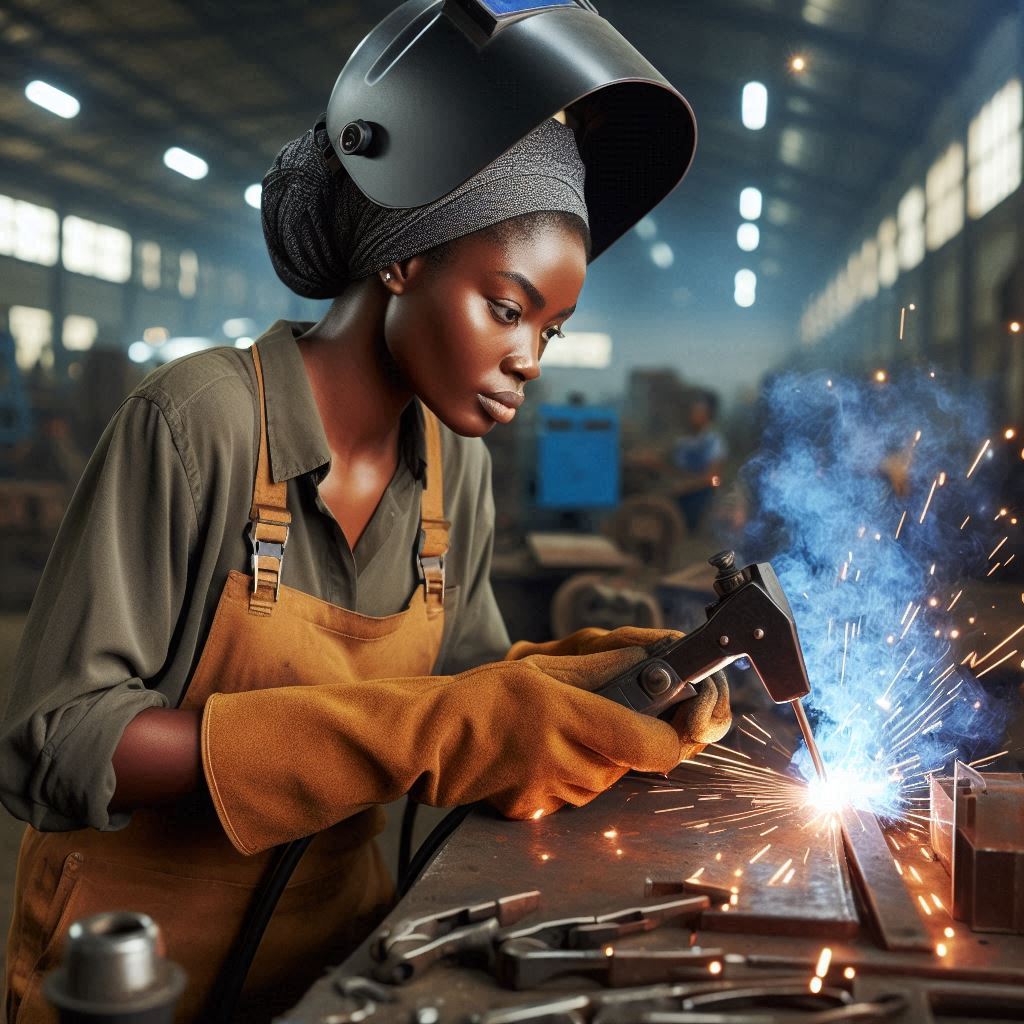Introduction
Metal fabrication in Nigeria stands as a cornerstone of the nation’s industrial landscape. This sector plays a crucial role in various industries, including construction, automotive, oil and gas, and manufacturing.
By involving processes like cutting, bending, and assembling metal structures, metal fabrication provides essential products and solutions that support the growth and functionality of these industries.
The importance of metal fabrication in Nigeria cannot be overstated. It supports infrastructure development, driving economic growth and enhancing technological advancement.
With increasing demand for high-quality metal products, the industry has witnessed rapid growth and significant advancements. Recent years have seen the sector embrace modern technologies and innovative techniques.
Innovations such as computer-aided design (CAD) software, automated cutting machines, and advanced welding techniques have revolutionized the industry, making it more competitive and capable of meeting global standards.
It is driving progress and supporting the nation’s economic aspirations by creating jobs, fostering technological innovation, and contributing to sustainable development.
The rapid growth and advancement in the metal fabrication sector highlight its pivotal role in shaping Nigeria’s future.
Traditional Metal Fabrication Techniques
In Nigeria, traditional metal fabrication techniques have been passed down through generations and are still widely used today. These methods involve manual labor and basic tools to shape and manipulate metal into various forms.
Common Traditional Methods Used in Nigeria
- Forging: Heating metal and hammering it into shape is a common traditional technique in Nigeria.
- Welding: Joining metal pieces together by heating and melting the edges is another widely used method.
- Chiseling: Using a chisel to carve designs or cut through metal is a traditional technique.
- Casting: Pouring molten metal into a mold to create a specific shape is also a traditional method.
Challenges and Limitations of Traditional Techniques
While traditional metal fabrication techniques have their advantages, they also come with challenges and limitations in Nigeria. Some of these include:
- Lack of precision and accuracy in shaping metal due to manual manipulation.
- Time-consuming process compared to modern methods like CNC machining.
- Limited ability to work with complex designs and intricate details.
- Increased risk of injuries and accidents for artisans using traditional tools.
Examples of Traditional Tools and Equipment Used in Metal Fabrication
Artisans in Nigeria rely on a variety of traditional tools and equipment to carry out metal fabrication work. Some of the common tools include:
- Hammer and Anvil: Used for shaping and bending metal through forging.
- Blowtorch: Essential for heating metal to high temperatures during welding and casting.
- Chisel and Punch: Used for carving designs, cutting metal, and creating intricate details.
- Mold: A mold made of sand or clay is used in casting to give metal a specific shape.
Despite the challenges and limitations, traditional metal fabrication techniques continue to play a significant role in the Nigerian economy and culture. Artisans who have mastered these methods are able to produce high-quality metal products that are in demand both locally and internationally.
Read: Career Opportunities in Agricultural Engineering in Nigeria
Emerging Technologies in Metal Fabrication
Exploring New Technologies in Metal Fabrication
In the realm of metal fabrication in Nigeria, emerging technologies are revolutionizing the industry. Let’s delve into the latest trends and innovations that are shaping the landscape of metal fabrication in the country.
- One of the key trends in metal fabrication in Nigeria is the adoption of advanced technologies to improve efficiency and quality in the manufacturing process.
- Computer Numerical Control (CNC) machines have become increasingly popular in metal fabrication shops across Nigeria. These machines offer precision and accuracy in cutting, shaping, and forming metal parts.
- Robotics and automation are also making their way into metal fabrication facilities in Nigeria. Automated systems help streamline production processes and reduce labor costs.
Impact of Automation and Digitalization on Metal Fabrication Processes
- Automation and digitalization have transformed metal fabrication processes in Nigeria by increasing productivity and reducing human error.
- By leveraging automation, metal fabricators in Nigeria can produce parts and components at a faster pace, leading to quicker turnaround times for customers.
- Digitalization has enabled real-time monitoring and control of fabrication processes, allowing for adjustments to be made swiftly to optimize production efficiency.
Cutting-Edge Tools and Equipment Used in Modern Metal Fabrication
- Laser cutting machines are a game-changer in metal fabrication, offering precise cutting of various metals, including stainless steel, aluminum, and copper.
- 3D printing technology is also gaining popularity in metal fabrication in Nigeria. This technology allows for the production of complex and intricate metal parts with quick turnaround times.
- Waterjet cutting machines are another innovative tool used in modern metal fabrication. These machines can cut a wide range of materials with high precision, making them versatile for various fabrication projects.
Essentially, the adoption of emerging technologies in metal fabrication is revolutionizing the industry in Nigeria. By embracing automation, digitalization, and cutting-edge tools, metal fabricators in the country are able to meet the growing demands of customers while maintaining high standards of quality and efficiency.
Read: Admission Requirements for Agricultural Engineering Programs
Sustainable Practices in Metal Fabrication
The metal fabrication industry in Nigeria is increasingly recognizing the importance of sustainability in their operations. Companies are realizing that adopting eco-friendly practices is not only beneficial for the environment but also contributes to cost savings and long-term viability.
Importance of Sustainability in the Metal Fabrication Industry
- Reducing carbon footprint: By implementing sustainable practices, metal fabrication companies can reduce their carbon emissions and contribute to combating climate change.
- Resource conservation: Sustainable practices help in conserving natural resources such as water and energy, ensuring their availability for future generations.
- Enhancing brand reputation: Consumers are becoming more conscious of environmental issues. Companies that prioritize sustainability can attract eco-conscious customers and enhance their brand reputation.
- Compliance with regulations: Governments are enforcing stricter environmental regulations. By adopting sustainable practices, metal fabrication companies can ensure compliance with laws and avoid penalties.
Eco-Friendly Materials and Practices in Nigeria
- Recycled metals: Many metal fabrication companies in Nigeria are utilizing recycled metals to reduce the demand for virgin materials and minimize waste.
- Water recycling: Some companies have implemented water recycling systems to reduce water consumption and minimize environmental impact.
- Energy-efficient equipment: Investing in energy-efficient machinery helps in reducing energy consumption and lowering operating costs in the long run.
- Green supply chain: Collaborating with suppliers who follow sustainable practices ensures that the entire supply chain is environmentally friendly.
Case Studies of Companies Implementing Sustainable Metal Fabrication Processes
Meta Craft Fabrications
Meta Craft Fabrications, a leading metal fabrication company in Nigeria, has implemented sustainable practices throughout its operations.
The company sources recycled metals for its projects, reducing the need for new materials. Meta Craft Fabrications also operates a water recycling system in its facility, significantly reducing water consumption and waste generation.
By embracing sustainability, Meta Craft Fabrications has not only reduced its environmental impact but also attracted new clients who prioritize eco-friendly practices.
Emobella Engineering Nigeria Limited
Emobella Engineering Nigeria Limited is another Nigerian company that has embraced sustainability in its metal fabrication processes. The company has invested in energy-efficient equipment, reducing its energy consumption by 20%.
Emobella Engineering Nigeria Limited also works with suppliers who follow eco-friendly practices, ensuring that its supply chain is sustainable.
By implementing these initiatives, ABC Engineering Solutions has been able to reduce costs, comply with regulations, and enhance its corporate social responsibility efforts.
Generally, sustainability is crucial for the metal fabrication industry in Nigeria. By adopting eco-friendly materials and practices, companies can reduce their environmental impact, attract customers, and ensure long-term success.
Case studies of companies like Meta Craft Fabrications and Emobella Engineering Nigeria Limited demonstrate the benefits of implementing sustainable processes. Moving forward, more metal fabrication companies in Nigeria should prioritize sustainability to create a greener and more sustainable future.
Read: Impact of Agricultural Engineering on Crop Production

Skills Development and Training Programs
The Importance of Skilled Labor in Metal Fabrication in Nigeria
Skilled labor is crucial to the success and advancement of metal fabrication in Nigeria. Skilled workers ensure the precision, quality, and efficiency of fabrication processes.
Their expertise helps in creating complex structures, meeting safety standards, and driving innovation within the industry. Without skilled labor, the sector would struggle to meet the increasing demands and high standards required by various industries.
Existing Training Programs and Institutions in Nigeria
Nigeria hosts several training programs and institutions dedicated to developing skilled labor in metal fabrication. These institutions offer comprehensive courses that cover the fundamentals and advanced techniques of metal fabrication.
Some notable institutions include the Federal Government Technical College (FGTC), Nigerian Institute of Welding (NIW), and various polytechnics and vocational training centers across the country.
The Federal Government Technical College provides hands-on training and theoretical knowledge in metalworking and fabrication. Their programs are designed to equip students with practical skills needed in the industry.
The Nigerian Institute of Welding focuses on specialized training for welders, offering certifications that are recognized both locally and internationally.
Polytechnics and vocational centers across Nigeria also play a significant role in nurturing skilled labor. These institutions offer diploma courses and short-term training programs in metal fabrication.
They aim to produce competent technicians who can immediately contribute to the workforce. These programs are crucial for addressing the skills gap in the industry and ensuring a steady supply of qualified professionals.
Initiatives to Promote Vocational Training in the Sector
Several initiatives aim to promote vocational training in Nigeria’s metal fabrication sector. The government, industry associations, and private organizations have launched various programs to enhance the skills of the workforce.
These initiatives focus on providing access to quality training, modern equipment, and updated curriculum that reflect current industry standards.
The Nigerian government has implemented policies to support vocational training. The National Board for Technical Education (NBTE) oversees technical and vocational education in the country.
They ensure that training programs meet the required standards and are relevant to industry needs. Government-funded initiatives also provide scholarships and grants to encourage youth participation in vocational training.
Industry associations like the Nigerian Association of Technologists in Engineering (NATE) and the Manufacturers Association of Nigeria (MAN) collaborate with training institutions to develop industry-specific curricula.
They organize workshops, seminars, and certification programs to keep professionals updated with the latest advancements in metal fabrication.
Private companies also contribute by setting up in-house training programs and partnering with educational institutions. These companies provide on-the-job training and internships, giving trainees practical experience in real-world settings.
Such collaborations help bridge the gap between theoretical knowledge and practical application, ensuring that graduates are job-ready.
Therefore, skilled labor is vital for the metal fabrication industry in Nigeria. Training programs and institutions play a key role in developing this workforce.
Initiatives by the government, industry associations, and private sector further promote vocational training, ensuring a steady supply of skilled professionals.
By investing in skilled labor, Nigeria can enhance the quality and competitiveness of its metal fabrication sector, driving economic growth and industrial development.
Read: Challenges Facing Agricultural Engineers in Nigeria
Industry Trends and Outlook
The metal fabrication industry in Nigeria is experiencing significant growth and evolution. Let’s delve into the current trends shaping this sector, explore future projections, and address potential challenges.
Current Trends
- Innovation in Technology: The adoption of advanced machinery and tools has become a common trend in the metal fabrication industry in Nigeria. From CNC machines to automated welding systems, technological advancements are boosting efficiency and precision in the fabrication process.
- Emphasis on Quality and Standards: There is a growing focus on adhering to international quality standards in metal fabrication. This trend is driven by the need to compete in the global market and attract international clients looking for high-quality products.
- Industry Collaboration: Collaboration among metal fabricators, suppliers, and other stakeholders is on the rise in Nigeria. This trend fosters knowledge-sharing, resource optimization, and the development of innovative solutions to common challenges in the industry.
- Sustainable Practices: Environmental sustainability has become a key trend in metal fabrication. Fabricators are increasingly adopting eco-friendly practices, such as recycling scrap metal and reducing energy consumption, to minimize the industry’s environmental impact.
Future Projections and Opportunities
- Growing Demand: The demand for metal fabricated products is expected to continue rising in Nigeria, driven by infrastructural development, urbanization, and industrialization. This presents a wealth of opportunities for metal fabricators to expand their market reach and increase their profitability.
- Export Potential: With the focus on quality and standards, Nigerian metal fabricators are well-positioned to tap into the export market. By producing high-quality products that meet international standards, they can access lucrative opportunities in regional and global markets.
- Diversification of Services: The future of metal fabrication in Nigeria lies in diversifying service offerings. Fabricators can explore new verticals, such as customized metal artwork, architectural metalwork, and specialized industrial components, to expand their customer base and revenue streams.
Potential Challenges and Solutions
- Skilled Labor Shortage: One of the major challenges facing the metal fabrication industry in Nigeria is a shortage of skilled labor. To address this, industry stakeholders can invest in vocational training programs, apprenticeships, and collaborations with technical institutions to develop a skilled workforce.
- Access to Capital: Limited access to capital is another challenge hindering the growth of metal fabricators in Nigeria. To overcome this, fabricators can explore alternative financing options, such as government grants, loans, and partnerships with financial institutions, to fund their operations and expansion plans.
- Regulatory Compliance: Meeting regulatory requirements and certifications can be a challenge for metal fabricators in Nigeria. By investing in compliance management systems, quality control processes, and continuous training for employees, fabricators can ensure that they meet industry standards and regulations.
Most Importantly, the metal fabrication industry in Nigeria is poised for growth and development, driven by current trends, future projections, and emerging opportunities.
By staying abreast of industry trends, embracing innovation, and addressing potential challenges proactively, metal fabricators in Nigeria can position themselves for success in the evolving market landscape.
Conclusion
Skilled labor is crucial for the growth and success of Nigeria’s metal fabrication industry.
Training programs and institutions like the Federal Government Technical College and the Nigerian Institute of Welding play vital roles in developing a competent workforce.
Polytechnics and vocational training centers across Nigeria also contribute significantly by providing comprehensive courses that address both fundamental and advanced metal fabrication techniques.
Government initiatives, along with efforts by industry associations and private companies, are essential in promoting vocational training and skill development.
Policies implemented by the National Board for Technical Education ensure that training programs meet industry standards.
Collaborations between educational institutions and industry stakeholders help bridge the gap between theoretical knowledge and practical application, ensuring graduates are well-prepared for the workforce.
I encourage readers to explore and adopt the latest advancements in metal fabrication. Investing in education and training will drive the industry’s growth and support Nigeria’s economic development.
By staying informed and embracing innovation, Nigeria’s metal fabrication sector can continue to thrive and contribute significantly to the nation’s industrial and economic progress.




